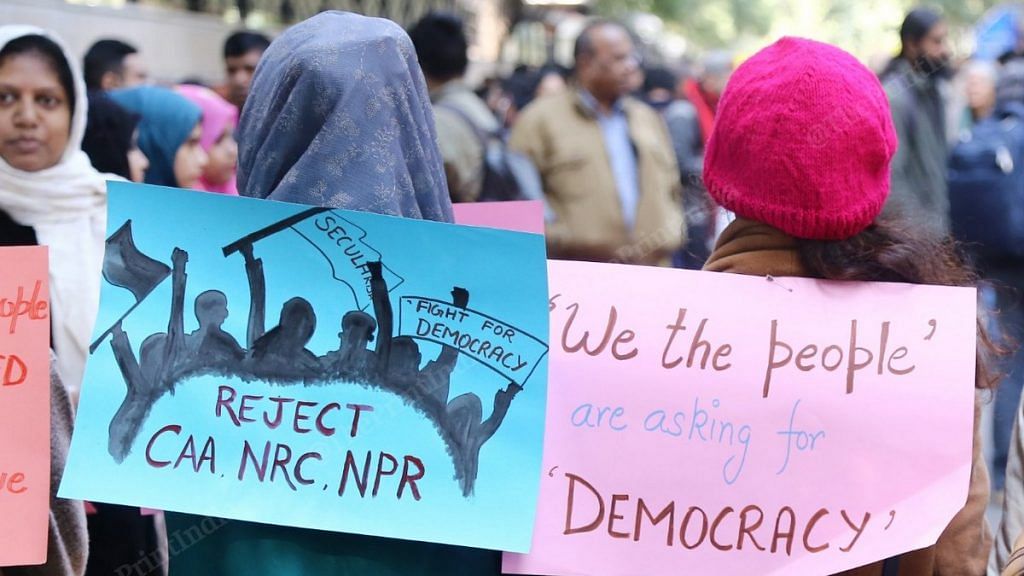New Delhi: Cow vigilantism, scrapping of Article 370, the Citizenship Amendment Act (CAA), lynching of Tabrez Ansari and the Ayodhya verdict — the US State Department has taken note of these issues in its annual Report on International Religious Freedom (IRF) of 2019 while it highlighted concerns of US officials on incidents of “violence and discrimination against religious and ethnic minorities”.
The report, released Wednesday by Secretary of State Mike Pompeo, was submitted to the US Congress stating that senior officials of the Donald Trump administration had repeatedly raised these concerns with their Indian counterparts.
“Today the State Department released a report detailing the status of religious freedom around the world. This report testifies to the fact that in many places, globally, individuals have become more familiar with religious oppression than religious freedom,” said Sam Brownback, Ambassador at Large for International Religious Freedom, while releasing the report.
According to the report, while the Narendra Modi government revoked the special status of Muslim-majority state of Jammu and Kashmir and split into two Union Territories last August, it “sparked protests, criticism from Muslim leaders, and challenges filed in the Supreme Court from opposition politicians, human rights activists, and others”, the report said.
“The (Indian) government sent thousands of additional security forces to the region, shut down many internet and phone lines, and had not restored full service by year’s end. The government also closed most mosques in the area until mid-December. Seventeen civilians and three security personnel were killed during the protests,” the report stated.
The report also mentioned in detail the widespread protests and legal challenges that erupted in India due to the government’s controversial CAA, which seeks to expedite citizenship for Hindu, Sikh, Buddhist, Jain, Parsi, and Christian migrants from Afghanistan, Bangladesh and Pakistan who entered the country on or before 31 December, 2014. The report noted that this was not extended to “similarly-situated migrants who are Muslims, Jews, atheists, or members of other faiths”.
“Some officials of Hindu-majority parties, including from the Bharatiya Janata Party (BJP), made inflammatory public remarks or social media posts against minority communities,” the 27-page report further stated.
Also read: Amit Shah, Adityanath, Anurag Thakur — 5 most provocative speeches of Delhi elections
‘Authorities failed to prosecute perpetrators of cow vigilantism’
In the annual religious minorities report, the State Department took a note of rising incidents of “cow vigilantism” across the country.
“Mob attacks by violent Hindu groups against minority communities, including Muslims, continued throughout the year amid rumors that victims had traded or killed cows for beef. Authorities often failed to prosecute perpetrators of such ‘cow vigilantism’, which included killings, mob violence, and intimidation,” the report stated.
It also mentioned the 2017 mob lynching and killing of cattle trader Pehlu Khan, Rakbar Khan and others.
“Throughout the year, representatives from the embassy and consulates met with government officials to discuss challenges faced by religious minorities, especially Christians and Muslims, incidents of cow vigilantism, the status of religious freedom in the country, and religiously motivated violence,” it said.
Also read: Cow vigilantes killed at least 44 people in three years, report finds
‘CAA – first ever law to use religion as criterion for citizenship’
The report by the State Department noted how the CAA created a massive upsurge in public protests and widespread criticism of the move in the country last year.
“The legislation — the first-ever to use religion as a criterion for citizenship — was criticized heavily by domestic and international media, NGOs, religious groups, intellectuals, and some political parties. Opponents stated it was unconstitutional because it violated the tenets of a secular state,” the report informed the US Congress.
The State Department also said “some (Indian) officials” also attempted to link the CAA legislation with the National Register of Citizens (NRC) — a process used to identify illegal immigrants in the state of Assam.
“Embassy representatives specifically reached out to civil rights NGOs, media representatives reporting on minority affairs, interfaith harmony groups, Muslim religious leaders and Muslim politicians to understand their fears concerning the CAA and its likely impact on the Muslim population in the context of potential government plans to draft the National Register of Citizens,” it said.
Among the other issues raised, it also made note of the Tabrez Ansari killing and a large-scale “sterilization” of Muslims and Christians. It also Further, the State Department took note of the issue of the Sabarimala temple in Kerala in its religious minorities report.
Also read: Beyond secularism & fascism: CAA gives opportunity to re-imagine clichés about idea of India
